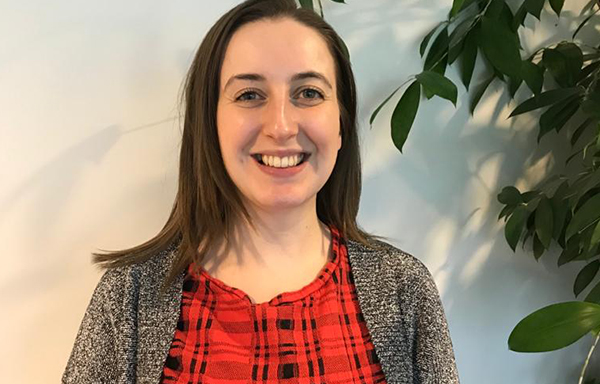Meet Sophie, our speech and language therapist

A belated welcome to speech and language therapist, Sophie Mustoe-Playfair, the newest member of the Speech & Language Link team! Sophie has spent very little time in the office this term as, no sooner had she arrived, she was whisked off around the country, with Heather and Louise to embark on county training in Buckinghamshire, Suffolk and The Rhondda – talk about Baptism by Fire! Sophie even managed to fit in getting married amongst all this – huge congratulations!
Now that Sophie is finally back in the office, we have the opportunity to find out a bit about more about her and the plans she has for her role at Speech & Language Link.
What made you want to work as a speech and language therapist?
I first became interested in speech, language and communication while I was working as a TA in a secondary school in Dorset. I had just finished my undergraduate degree in Psychology, and during my time as a TA I worked with lots of students with many different needs.
As we had limited contact with speech and language therapy services, I didn’t have any specific training coordinated by a SaLT or any guidance with regard to interventions, despite plenty of the young people I worked with having SLCN. As a result, there was lots of ‘figuring it out for myself’ and I spent my spare time researching and learning as much as I could to support the students. This is what prompted me to think about speech and language therapy as a career and wonder about how SEN and SLCN would be supported in an ideal world.
After that, I started working for Bournemouth University and worked on projects to increase aspirations for disadvantaged students including helping to develop a literacy programme for KS2 and KS3 pupils. I was sad to leave that job, but it did confirm that SaLT was the right direction for me, because I so enjoyed developing creative ways to support children in their schools.
Before and during my SaLT training I also volunteered with Headway – The Brain Injury Association, working with adults who had suffered a brain injury assisting in support groups and acting as a conversation partner for adults who had acquired language difficulties as a result of their injury. Dealing with the lifelong impact of language difficulties and it made me think about what kind of service I would like to be able to provide for families to support them to the best of my ability. It was – and still is – just fascinating to me the variety of the different kinds of work SaLTs do!
If schools could do one thing to better support their children who have SLCN what would that be?
Ensure that the interventions you put in place are meaningful for the child and can be carried over into the classroom and into everyday activities. It’s absolutely crucial that children get lots of facilitated opportunities to practice their new speech, language and communication skills in real-life situations. Therapy doesn’t stop at the end of a block of sessions, unfortunately!
What have you noticed about schools, that manage their pupils’ SLCN needs well, do in particular?
Schools who are the most successful with their SLCN support foster a whole-school approach for supporting their children. This support is well-coordinated, staff are well informed and robust classroom strategies are in place that benefit all children. Really importantly, interventions are applied consistently which helps the children to know what to expect, how to respond, and encourages them to be independent in their learning as much as possible.
Can you tell us a bit about what you are working on at the moment?
We’re just now wrapping up the huge amount of training that we’ve been carrying out across the country this autumn, so now that I’m back in the office I’m busy producing lots of content and helping out on the Speech & Language Help Desk. I’ve been writing articles for the ‘Ask a Therapist’ feature in The Link magazine and blogs for our website. As some of our readers may know, we have also recently set up The Link Facebook Group, so I’ve also been working on some of our ‘Thursday Thoughts from a Therapist’ posts to (hopefully) give our members something interesting to think about.
Is there anything in the pipeline that you are working on?
We are in the final throes of creating a very exciting new resource – watch this space early next year! We’re also working on lots of new developments and updates for all of our packages, but I’m not sure how much I’m allowed to say about that before it’s all ready to go live… Needless to say, 2020 looks set to be a busy year for all of us here at Speech Link!
Schools can now contact the speech and language therapy team directly if they have any questions for our ‘Ask a Therapist’ feature at: therapist@speechlink.co.uk